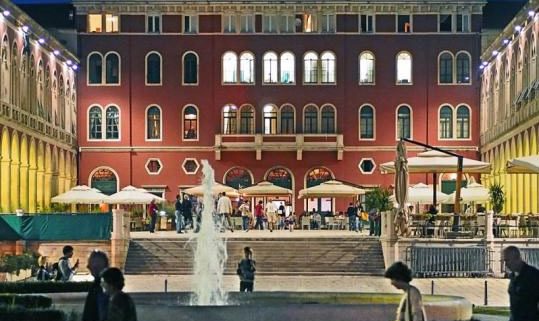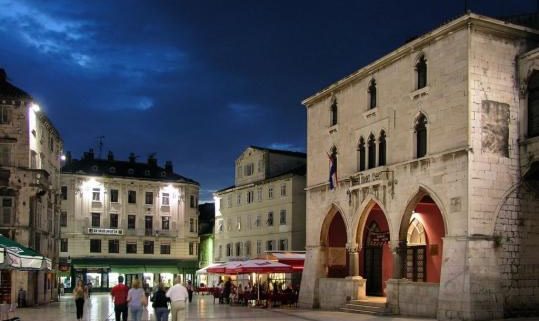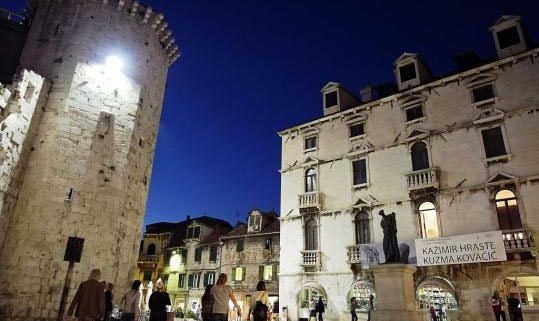Trgovi

Prokurative
Prokurative (Trg Republike) su veliki trg smješten zapadno od Rive, kojega nalik venecijanskom Trgu svetog Marka s tri strane okružuju neorenesansne zgrade s lukovima po kojima je i trg dobio svoje ime po kojem ga najviše ljudi zna. Trg je otvoren jedino prema jugu, pružajući prekrasan pogled prema luci i Rivi.
Gradnju Prokurativa je sredinom 19. stoljeća inicirao jedan od najpoznatijih gradonačelnika u povijesti grada Antonio Bajamonti, koji je želio pokazati da je Split svim svojim bićem oslonjen na talijanske tradicije. Otud i kolonada poput venecijanske, i reljefi nad prozorima koji prizivaju antičke i renesansne utjecaje. Bajamonti je na trgu napravio i svoje veliko kazalište, uništeno u požaru.
Trg je odavno etabliran kao odlična pozornica za kulturna događanja, posebno festival zabavne glazbe, a tamošnji kafići i restorani učini su ga popularnim okupljalištem Splićana. Sastavni dio Prokurativa je i plato južno od njih, na kojem je do 1947. stajala velika neoklasična fontana, koju su uništile komunističke vlasti, zbog navodne povezanosti s talijanskom vlašću u Splitu i Dalmaciji.


Pjaca
Pjaca (Narodni trg, još jedan trg kojega nitko u Splitu ne zove pravim imenom), prvi se put spominje u 13. stoljeću kao Širina sv. Lovre, i prvi je naseljeni dio Splita izvan Dioklecijanove palače, uz čiji se zapadni zid smjestio. Već stoljećima Pjaca je središnja pozornica gradskog života, tu je u gotičkoj zgradi stare gradske vijećnice, danas izložbenom prostoru, bila smještena vlast, u još uvijek prekrasnim i sačuvanim palačama uz rubove Pjace živjele su plemićke obitelji Cambj, Pavlović, Nakić, Ciprianis, Karepić… Tu je i jedna od najstarijih još uvijek otvorenih knjižara na svijetu, Morpurgo, koja i danas izgleda skoro onako kako je izgledala 1861., a u kavani Central u kojoj su se okupljali splitski intelektualci začetak je splitskog turizma, s nekadašnjim hotelom Troccoli. Na Pjaci je stoljećima i gradski sat, jedinstven po svoje 24 umjesto 12 znamenaka, a u okolnim kavanama, restoranima i kafićima Splićani su oduvijek nalazili mjesto za odmor, susrete, mjesto gdje su mogli svih vidjeti i biti viđeni, pretresti najvažnije događaje iz grada. Svaka zgrada na Pjaci ima svoju priču, svaka je svjedok povijesti i gradskog duha. Tako je bilo jučer, tako je i danas, kad je Pjaca ispunjena brojnim kafićima, restoranima i trgovinama, i kad je postala jedan od najvažnijih punktova za turiste koji žele uživati u onome u čemu uživaju i njihovi domaćini, Splićani.


Voćni trg
Vjerovali ili ne, ali i ovaj trg, možda i najljepši u gradu, među Splićanima je poznatiji po svom neslužbenom, nego službenom imenu Trg braće Radić. Svoje “narodno” ime može zahvaliti činjenici da je tu nekad bila bučna i živopisna tržnica na kojoj su žene iz okolnih sela prodavale voće. Na susjednom trgu, zapadno od Voćnog, prodavalo se povrće.
Nekoliko je važnih znamenitosti na ovom nevelikom trgu koji buja životom u kafićima, restoranima i ekskluzivnim trgovinama, i na kojem se često održavaju sajmovi. Najveća je svakako osmerokutna mletačka kula, ostatak nekadašnje utvrde, sagrađene u 15. stoljeću za obranu tadašnjeg malog grada. Nasuprot kuli je veličanstvena palača stare obitelji Milesi iz 17. stoljeća sa spektakularnom baroknom fasadom, jednim od najboljih primjera tog stila u cijeloj Dalmaciji.
Pred njom je, pak, smješten spomenik ocu hrvatske književnosti, Splićaninu Marku Maruliću, koji je bio jedan od najvažnijih mislilaca i intelektualaca 15. stoljeća. Autor spomenika je, kao i nekoliko drugih u gradu, Ivan Meštrović. To, naravno, nije sve, jer svaki kamen na Voćnom trgu, kao i na drugim starim gradskim trgovima, priča povijest kojoj je svjedočio, sve do najstarijih dana, čiji je “predstavnik” jugozapadna kula Dioklecijanove palače na samom izlazu s Voćnog trga na Rivu.
Zbog svega toga, poput Pjace, Voćni trg ima posebno mjesto u splitskim srcima, sve do toga da je bio središnje mjesto u jednoj od najpopularnijih hrvatskih TV serija, sagi o Splitu “Velom mistu”.


 Hrvatski
Hrvatski English
English Deutsch
Deutsch Italiano
Italiano



